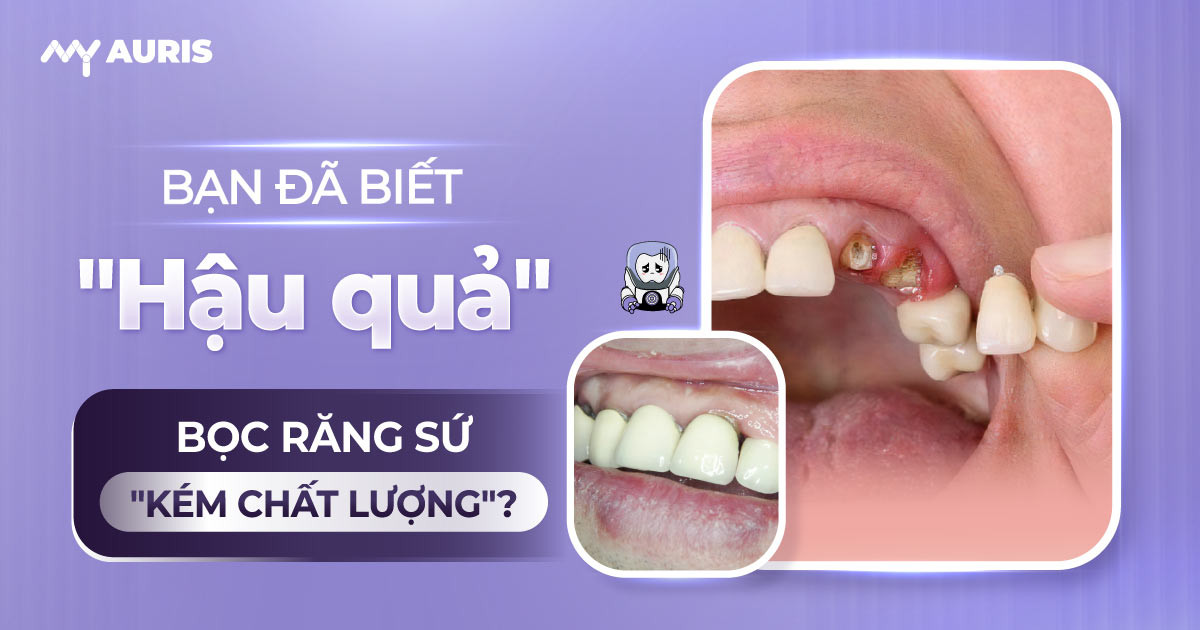Ceramic dental crowns are a popular cosmetic solution, providing beautiful, bright white teeth. However, porcelain crowns also have certain potential consequences if not done properly. This article will help you better understand the risks you may encounter when wearing porcelain crowns, thereby making wise decisions for your oral health.
Consequences of porcelain crowns to keep in mind
Porcelain dental crowns are one of the popular dental cosmetic methods today, helping you have bright, white, beautiful teeth. However, not everyone knows that porcelain crowns can also have potential negative consequences if not done properly.
Pain: Causes and remedies
Pain after porcelain crowns is one of the common problems. The main cause is that the tooth has been ground down too much, causing damage to the dental pulp or due to irritation with the dental covering material.
Pain can be expressed in many forms:
- Pain: A dull, aching, prolonged feeling of pain, often occurring when eating or coming into contact with hot or cold foods.
- Pain: A sharp, sharp, transient feeling of pain, often appearing when eating or coming into contact with sour or sweet foods.
- Headache: Feeling of pain in the temples or back of the neck, often occurs when toothache lasts for a long time.
How to fix:
- Contact your dentist as soon as there are signs of pain: The doctor will check your dental condition and recommend a suitable treatment plan.
- Using pain relievers: Your doctor may prescribe pain relievers for temporary pain relief.
- Diet: Avoid hard, hot, cold, sour, sweet foods to avoid tooth irritation.

Gingivitis: Potential risks and ways to prevent it
Gingivitis is an inflammation of the gum tissue around the teeth, often caused by improper oral hygiene, or due to ill-fitting porcelain crowns. appropriate.
Signs of gingivitis:
- Red, swollen gums that bleed when brushing or flossing.
- Sensitive, vulnerable gums.
- Bad breath.
How to prevent:
- Proper oral hygiene: Brush your teeth twice a day, floss every day, rinse your mouth with saline.
- Choose a reputable dentist: Get porcelain crowns at a reputable dentist, ensuring the quality of porcelain teeth and crowning techniques.
- Regular check-ups: Regularly check your teeth and gums to detect gingivitis early.
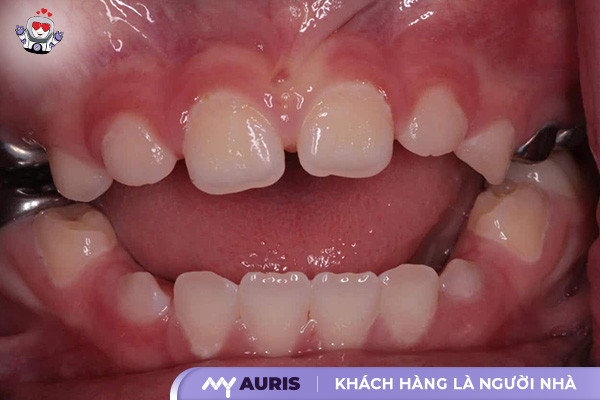
Allergy: Symptoms and treatment
Allergy to porcelain dental crown material is a fairly rare problem, but can cause serious health effects.
Symptoms of allergy:
- Red, painful, itchy gums.
- Acne, red rash around the mouth.
- Feeling of discomfort, pain, burning sensation.
- Difficulty breathing, nausea, dizziness face.
How to handle:
- Stop using porcelain teeth: As soon as signs of allergy are detected, stop using porcelain teeth.
- Contact a dentist: Your doctor will check for allergies and recommend appropriate treatment options.
- Use anti-allergic drugs: Your doctor may prescribe anti-allergic drugs to reduce symptoms. evidence.
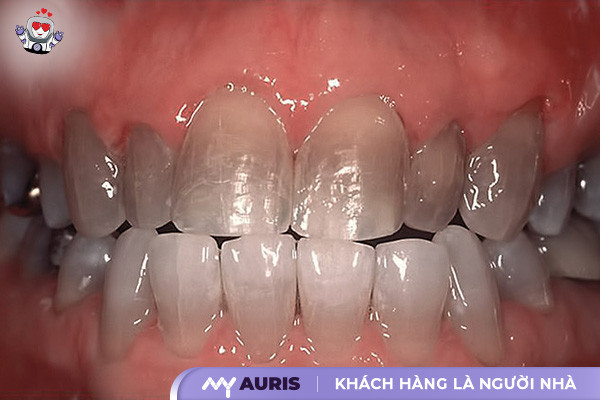
Color change: Causes and protection
Ceramic teeth can change color after a period of use, due to many reasons:
- Poor quality materials: Porcelain teeth are made from poor quality materials, easily become yellow and discolored over time.
- Improper oral hygiene: Bacteria accumulate on the surface of porcelain teeth, causing discoloration.
- Eating habits: Drinking coffee, tea, wine, and cigarettes can discolor porcelain teeth.
How to protect the color of porcelain teeth:
- Choose a reputable dentist: Get porcelain crowns at a reputable dentist, using high quality porcelain materials.
- Proper oral hygiene: Brush your teeth twice a day, floss every day, rinse your mouth with saline.
- Avoid colored foods and drinks: Limit the use of coffee, tea, wine, and tobacco.
- Use toothpaste for porcelain teeth: Toothpaste for porcelain teeth has the ability to clean porcelain teeth effectively, without abrading the tooth surface.
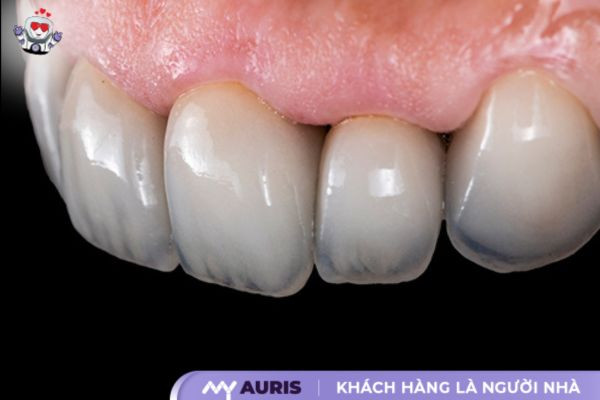
Causes of consequences of dental crowns Porcelain
Are you planning to get porcelain crowns to improve your smile and gain more confidence? However, porcelain crowns also pose risks if not done properly. The choice of material, crown technique, oral care and the possibility of allergies can all affect oral health and even overall health.
Poor quality materials
Ceramic tooth material plays an important roleimportant in determining the durability, aesthetics and safety of porcelain teeth. On the market today, there are many types of porcelain teeth with different materials and prices. However, not all types of porcelain teeth are suitable for all cases.
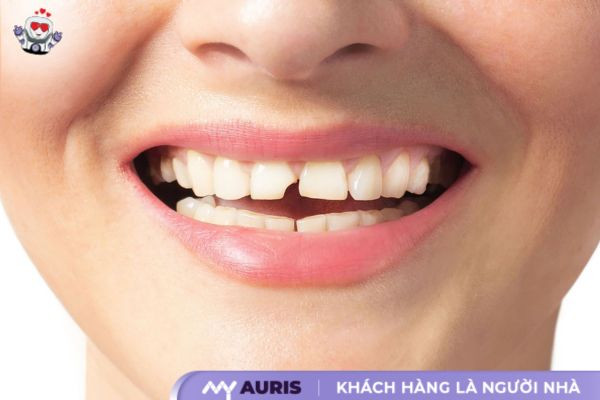
Consequences of poor porcelain crowns when using poor quality materials:
- Porcelain crowns turn black: Poor quality porcelain crowns can oxidize or change color after a period of use.
- Ceramic crowns cause headaches: Poor quality porcelain crowns can cause sensitivity or pain due to incompatibility with real teeth.
- Ceramic crowns cause allergies: Poor quality materials may contain irritating ingredients, leading to gingivitis or allergies.
- Broken or chipped porcelain teeth: Poor quality materials can be cracked, chipped, reducing the lifespan of porcelain teeth.
To avoid these consequences, you should choose a reputable dentist and quality dentistry for advice on using the type of porcelain teeth suitable for your dental condition and financial ability.
To choose the appropriate porcelain tooth material, you should note:
- Material: You should choose porcelain tooth material with high durability, good abrasion resistance, and no discoloration after long-term use.
- Size: The size of porcelain teeth must match the size of real teeth to ensure aesthetics and chewing function.
- Color: The color of porcelain teeth must match the color of real teeth to create harmony for the smile.
- Shape: The shape of porcelain teeth must match the structure of real teeth, ensuring aesthetics and good chewing ability.
Improper porcelain crown technique
Porcelain dental crown technique requires meticulousness and high precision. Improper dental crown technique can lead to many negative consequences.
Improper porcelain crown consequences when tooth crown technique is incorrect:
- Porcelain crowns cause gingivitis: RCeramic implants that are not installed correctly can damage the gums, allowing bacteria to attack, leading to gingivitis.
- Ceramic teeth are exposed and do not fit tightly: Improper crowning techniques can cause porcelain teeth to not fit tightly to real teeth, causing food to become trapped, creating conditions for bacteria to grow.
- The porcelain tooth is loose: If the crown technique is not correct, the porcelain tooth can shake or even fall out of position.
- Broken or chipped porcelain teeth: Improper crowning techniques can cause broken, chipped porcelain teeth, reducing the lifespan of the porcelain teeth.
To avoid these consequences, you should choose a reputable dentist with high expertise and many years of experience in the field Porcelain crowns.
Some notes when choosing a porcelain crown dentist:
- Choose a dentist with high expertise: You should choose a dentist who is well-trained and highly specialized in the field of porcelain crowns.
- Experienced dentist: You should choose a dentist with many years of experience in the field of porcelain crowns, ensuring professional techniques and minimizing risks.
- Caring dentist: You should choose a dentist who is passionate about the profession, always putting the patient’s health and interests first.
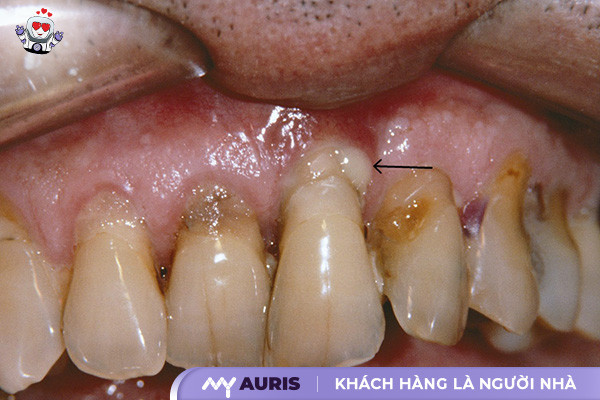
Oral care poor
After porcelain crowns, proper oral care is very important to ensure porcelain teeth are durable, beautiful and safe.
The consequences of porcelain crowns are not good when you take poor oral care:
- Gingivitis caused by ceramic crowns: Poor oral hygiene can cause bacteria to accumulate, causing gingivitis and affecting oral health.
- Discolored porcelain teeth: Improper oral hygiene can cause porcelain teeth to become yellow or discolored.
- Cayed porcelain teeth: Porcelain teeth that are not properly cared for can cause tooth decay, causing pain and affecting oral health.
- The porcelain tooth is peeling: Good oral hygieneIf you are careful, you can cause porcelain teeth to peel off, causing loss of aesthetics and affecting chewing function.
To effectively take care of porcelain teeth, you should:
- Brush your teeth properly: You should brush your teeth twice a day, using a soft-bristled toothbrush and toothpaste containing fluoride.
- Use dental floss: Dental floss should be used to remove food particles stuck between teeth.
- Rinse your mouth with mouthwash: You should rinse your mouth with mouthwash containing fluoride to kill bacteria and protect your teeth.
- Regular dental check-ups: You should have regular dental check-ups every 6 months to check oral health and detect problems early.
Allergy to material
Some people may be allergic to components in the material of porcelain teeth. Allergy to the material can occur immediately after porcelain crowns or after a period of use.
The consequences of porcelain crowns are not good when allergic to the material:
- Porcelain crowns cause gingivitis: Allergy to porcelain tooth material can cause gingivitis, swelling, redness, and pain.
- Ceramic dental crowns cause headaches: Allergies to porcelain dental materials can cause headaches, dizziness, and nausea.
- Ceramic crowns cause difficulty breathing: Severe allergies can cause difficulty breathing, even anaphylactic shock.
To prevent allergies, you should:
- Inform your dentist about your history of allergies: You should inform your dentist about your history of allergies for advice and to choose appropriate materials.
- Check your body’s reaction: You should check your body’s reaction to the porcelain tooth material before covering your teeth.
- Use trial porcelain teeth: You should use trial porcelain teeth to check the body’s reaction before permanently wearing porcelain teeth.
How to prevent bad consequences when wearing porcelain teeth
Do you want to have a radiant smile with bright white and beautiful teeth? Porcelain crowns are a solution chosen by many people because of their high aesthetics and ability to overcome many defects of real teeth. However, if not careful, porcelain crowns can have negative consequences, affecting your oral health and aesthetics.

Choose a reputable dentist credit
Choosing a reputable and experienced dentist is the most important factor to ensure the safety and effectiveness of the porcelain crown process.
How to choose a reputable dentist?
- Check qualifications and practice certificates: Dentists must have a professional degree in dentistry and be licensed to practice by a competent medical agency.
- Seek opinions from relatives and friends: Ask people who have had porcelain crowns done about their experiences and reviews of the dentist.
- Review the dentist’s profile and achievements: You should learn about the dentist’s professional qualifications, skills, and experience through websites, social networks, or articles and videos shared about dentistry.
- Choose a reputable dental clinic: Reputable dental clinics often have a team of good dentists, modern equipment, professional medical examination and treatment procedures and good customer care service.
- Get a free consultation: You should meet with your dentist to discuss your dental condition, needs and desires, and ask questions to evaluate the dentist’s expertise and dedication.

Proper oral care
Proper oral care after porcelain crowns is extremely important to keep porcelain teeth always beautiful, shiny and durable.
Remember the principles Oral care after porcelain crowns:
- Brush your teeth properly: Use a soft-bristled toothbrush, toothpaste containing fluoride and brush your teeth from the roots to the tips.
- Using dental floss: Removes food scraps and plaque from between teeth gHelps limit gingivitis and keep porcelain teeth clean.
- Gargling with saline water: Gargling daily with saline water after brushing your teeth helps eliminate bacteria and clean the oral cavity.
- Avoid hard, chewy foods: Hard, chewy foods can easily chip or break porcelain teeth. You should limit eating these foods or be careful when eating them.
- Change your toothbrush periodically: Replace your toothbrush with a new one after 3 months or when the bristles become worn.
- Regular dental check-ups: You should visit the dentist for regular dental check-ups every 6 months to promptly detect and handle arising problems.
Regular check-ups
Regular check-ups help you detect potential problems early, promptly prevent possible complications, and help you maintain optimal oral health.

Go to the dentist for regular dental checkups:
- Checking the condition of porcelain teeth: The dentist will check the condition of porcelain teeth, detecting early signs of chipping, breakage, and peeling.
- Check gum condition: The dentist will check gum condition, detect early signs of gingivitis and receding gums.
- Professional oral hygiene: The dentist will use professional tools to remove plaque and tartar, keeping porcelain teeth clean, shiny and protecting healthy gums.
- Oral care consultation: The dentist will advise on how to care for your teeth in accordance with your oral condition after porcelain crowns.
Follow the dentist’s instructions dentist
Strict compliance with the dentist’s instructions is the key to helping you protect your oral health and keep your porcelain teeth beautiful and durable.
Remember the dentist’s instructions:
- Use medication as prescribed: If your dentist prescribes medication, use the correct dosage and schedule.time.
- Adhere to a suitable diet: Your dentist will advise you on a diet suitable for your oral condition after porcelain crowns.
- Limit the use of stimulants: Stimulants such as tobacco and alcohol can affect oral health and reduce the lifespan of porcelain teeth.
- Avoid strong impacts on porcelain teeth: Avoid activities that can cause strong impacts on porcelain teeth, such as chewing hard objects, biting nails…
- Contact your dentist if there are any changes: If you feel pain, sensitivity, or discomfort in your porcelain teeth, contact your dentist immediately for timely examination and treatment.
Compare the consequences of porcelain crowns with other restoration methods
Oral health care is an important factor, directly affecting the digestive system and health. whole body. When teeth have problems, many people seek cosmetic orthodontic methods to improve their smile and confidence. Porcelain crowns, braces, dental fillings and dental implants are popular methods. However, each method has its own advantages and disadvantages and potential consequences.
Consequences of braces
Braces are an orthodontic solution that helps adjust tooth position, bringing results. The teeth are beautiful and the bite is standard. However, if the technique is not performed correctly or oral care is not taken properly, braces can lead to:
- Sensitivity and discomfort: Moving teeth for a long time can cause sensitivity and discomfort, especially after periodic teeth tightening.
- Soft tissue damage: Brackets and wires can rub against cheeks and gums, causing soft tissue damage.
- Gingival recession: Difficult oral hygiene with braces can lead to plaque buildup, causing gingivitis and gum recession.
- Tooth enamel demineralization: The braces process can demineralize tooth enamel, making teeth more susceptible to tooth sensitivity and tooth decay.
- Long treatment time: Braces usually take 1-3 years, even longer depending on the condition of the teeth.
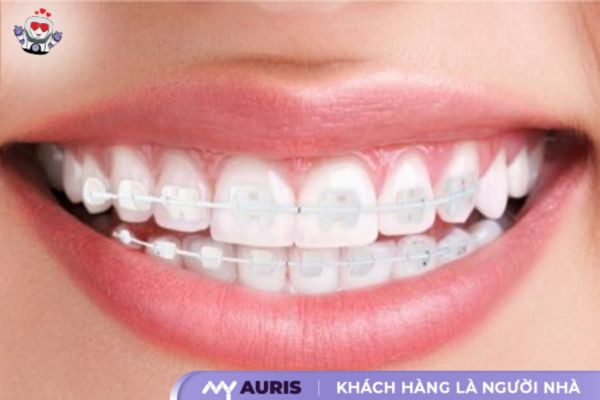
Consequences of tooth filling
Tooth filling is a method of restoring the shape and function of decayed, cracked or chipped teeth. Common dental filling materials are composite and amalgam. Although dental fillings are quite safe, some consequences can still occur such as:
- Teeth sensitivity: After tooth filling, you may feel pain when eating or drinking hot, cold or sour foods.
- Dental fillings peeling off: Dental fillings can peel off due to strong chewing forces or improper oral care.
- Color change: Amalgam fillings can oxidize over time, causing the tooth to become dark gray.
- Infection: If the tooth filling technique is not sterile, bacteria can enter the tooth pulp causing infection.
Consequences of dental implants
Dental implants are an effective and long-lasting solution for restoring lost teeth. This method uses an implant that is implanted into the jawbone, then a porcelain crown is attached on top. However, dental implants also have some potential risks such as:
- Infection: Infection can occur during surgery or after implant placement.
- Nerve damage: During surgery, doctors can accidentally damage nerves, causing numbness in the lip and chin area.
- Implant damage: Implants can be damaged due to too much chewing force or poor oral care.
- Jaw bone loss: If not properly cared for, the jaw bone around the implant can be lost.
- High cost: Dental implants are the tooth restoration method with the highest cost.
Cost and time for porcelain crown
Are you planning to get porcelain crowns to have a more beautiful and confident smile? Besides the aesthetic benefits, porcelain crowns also come with concerns about cost and implementation time.

Factors affecting the cost of porcelain crowns
Cost Porcelain crowns are not fixed, it depends on many factors, including:
- Ceramic teeth material: Porcelain teeth are made from many different materials, each type has its own advantages and disadvantages in terms of durability, aesthetics, compatibility with the body and of course, cost. All-ceramic teeth often cost more than metal-ceramic teeth.
- Number of teeth to be covered: The more teeth to be covered, the higher the cost.
- Dental clinic: Each dental clinic has different prices, depending on reputation, service quality and doctor’s qualifications.
- Dental condition: If your teeth have many problems that need to be treated before getting porcelain crowns such as gingivitis, tooth decay, etc., the cost will increase.
In addition, the size, shape and color of the porcelain teeth are also factors that affect the cost. fee.
Choose a reputable dental clinic:
Choosing a reputable dental clinic is extremely important, directly affecting oral health and aesthetic effect after porcelain veneers. Don’t choose low-quality facilities because of the cheap price, with many potential risks such as: the consequences of porcelain crowns are not good, porcelain crowns cause gingivitis, porcelain crowns turn black, porcelain crowns cause headaches, porcelain crowns cause allergies…
Time needed to cover teeth porcelain
The time it takes to cover porcelain teeth depends on the number of teeth, dental condition and the doctor’s technique. Normally, the porcelain crown process takes about 2-3 appointments, each 1-2 weeks apart:
- 1st time: Doctor examines, consults, takes X-rays and takes tooth impressions.
- Second time: You try on the porcelain teeth and adjust accordingly.
- Third time: Fix the porcelain teeth on real teeth.
Proper oral care after porcelain coating:
After porcelain crowns, you need to pay attention to proper oral care to maintain Maintain the aesthetic effect and prolong the life of porcelain teeth:
- Brush your teeth at least twice a day with a soft-bristled toothbrush and fluoride toothpaste.
- Use dental floss to clean between teeth.
- Rinse your mouth with specialized mouthwash.
- Avoid eating foods that are too hard, too chewy, too hot or too cold.
- Regular dental check-up every 6 months for the doctor to check and clean teeth.
Experience of people who have had porcelain crowns
Are you looking for information about the experience of porcelain crowns? Are you worried about possible consequences after dental crowns? Join us to learn about practical experiences from people who have undergone the porcelain crown process to make wise decisions for yourself.

Share your experience with porcelain crowns
Porcelain dental crowns are a popular cosmetic solution to improve smiles and correct tooth defects. However, to ensure safety and effectiveness, you need to choose a reputable and experienced dentist.
Experience 1: Choose a reputable dentist and clinic:
- Find out carefully about the dentist’s qualifications, experience and license to practice.
- Seek opinions from friends, relatives or search for information on reputable forums.
- Choose a dental clinic with full modern equipment, ensuring hygiene and safety.
- Ask clearly about the porcelain crown process, materials used and costs.
Experience 2: Prepare carefully before porcelain crowns:
- General oral health check.
- Discuss your wishes and goals thoroughly with your dentist.
- Ask clearly about the types of porcelain teeth, their advantages and disadvantages, and their suitability for your condition.
- Prepare mentally and financially for the porcelain crown process.
Experience 3: Caring for porcelain teeth after crowning:
- Avoid eating too hot, too cold, hard, chewy or darkly colored foods.
- Regular check-ups with your dentist to monitor the condition of porcelain teeth and maintenance.
Effectiveness assessment
Ceramic crowns bring highly aesthetic results, helping you Possesses a confident and radiant smile. However, the effectiveness of porcelain crowns depends on many factors:
- Ceramic teeth material: Good materials will ensure the durability, color and aesthetics of porcelain teeth.
- Tooth crown technique: Correct tooth crown technique will help porcelain teeth look natural and in harmony with the real tooth structure.
- Caring for porcelain teeth: Proper care helps maintain the longevity and aesthetics of porcelain teeth.
Cost evaluation
The cost of porcelain crowns depends on many factors:
- Ceramic tooth material: High quality materials often cost more than regular materials.
- Number of teeth to cover: Covering many teeth will cost more than covering a few teeth.
- Dental clinic: Each dental clinic will have different prices.
Ceramic dental crowns are a popular cosmetic solution, but not everyone understands the potential consequences. To avoid unnecessary risks, you need to choose a reputable dentist, take proper care of your teeth, have regular checkups and follow your doctor’s instructions. You should compare with other orthodontic methods to choose the method that best suits your tooth condition. Please contact My Auris for advice and support, you will have a brighter and more confident smile!
Thu Lieu


